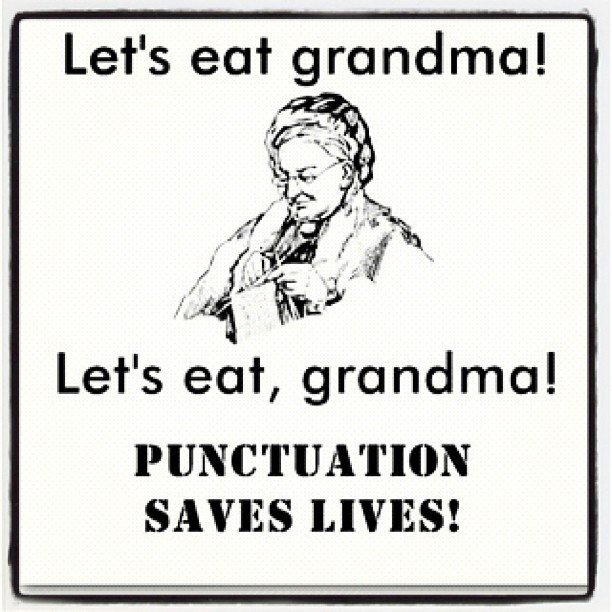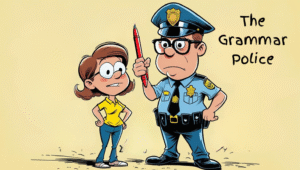Let’s be honest—when you’re in the crosshairs of the Grammar Police, it’s never a pleasant experience. We’ve all been there: you fire off a quick comment on Facebook, maybe praising your high school friend’s latest vacation photos (seriously, Maldives? I’m jealous!), or responding to a thought-provoking post about the merits of pineapple on pizza (yes, I’m pro-pineapple, fight me!). Suddenly, BAM! Instead of likes and thoughtful replies, you’re hit with a barrage of “um, you meant ‘too,’ not ‘to'” or a chorus of “it’s ‘there,’ not ‘their,’ you illiterate barbarian!”
Have you just been initiated into the ranks of those hunted by the dreaded… Grammar Police?
Yeah, I’m talking about those self-appointed guardians of the English language, the ones who lurk in the shadows of comment sections, ready to pounce on any grammatical transgressions. While a tiny part of me appreciates their commitment to linguistic purity, a much larger part of me wonders… are they doing more harm than good? Are they helping improve communication, or just making people feel small and stupid?
Let’s dive into this grammatical minefield, shall we?
The Shame Spiral: “There,” “Their,” and “They’re” and Other Horrors Nabbed by Grammar Police
Look, I get it. Grammar can be tricky. English, in particular, is a glorious, messy, often illogical beast. And those pesky homophones (words that sound alike but have different meanings and spellings) are the bane of many a writer’s existence. “There,” “their,” and “they’re” are, arguably, the holy trinity of grammatical confusion. They’re the Bermuda Triangle of the English language, sucking in unsuspecting victims who just want to express themselves.
I’ll confess, I’ve been lost in that Bermuda Triangle more times than I care to admit. Even now, with a healthy dose of proofreading and a reliance on Grammarly (my secret weapon, don’t tell!), I still occasionally slip up. And you know what? It’s embarrassing.
That little red squiggly line mocking you from beneath your words. The feeling of your heart sinking as you realize you’ve used the wrong form of “your” (or worse, “you’re”!). The internal debate: do I edit it and risk drawing even more attention to my blunder, or do I just leave it and hope nobody notices?
Is it Laziness or Just… Uninformed? The Great Debate
This is the million-dollar question. Are grammatical errors simply a sign of laziness? Is it just a case of people not caring enough to double-check their work? Or is there something more to it?
I’d argue that it’s often the latter.
- Not Everyone Had the Same Educational Opportunities: Let’s face it, not everyone has access to the same quality of education. Some people may have struggled in school, others might have had to prioritize working over studying, and some might learn differently. To assume that everyone has a perfect grasp of grammar is not only unfair but also completely unrealistic.
- Dyslexia and Other Learning Differences: Many people struggle with dyslexia or other learning differences that can make spelling and grammar incredibly challenging. For them, navigating the complexities of the English language is a daily battle. Jumping down their throats for a misplaced apostrophe is not only insensitive but also deeply hurtful.
- English as a Second Language (ESL): For individuals who are learning English as a second language, grammar is an entirely different beast. They’re not just grappling with the rules of the language, but also the nuances of pronunciation, culture, and context. Cut them some slack! They’re doing amazing!
- Speed and Convenience: We live in a fast-paced world where communication is often instantaneous. We’re firing off texts, emails, and social media posts at lightning speed. Sometimes, in the rush to get our thoughts out, grammar takes a backseat. It’s not necessarily laziness, but rather a trade-off between speed and perfection.
So, while laziness might play a small role, I believe that more often than not, grammatical errors are a result of a complex mix of factors, including educational background, learning differences, and the demands of modern communication.
The Grammar Police: Heroes or Villains?
Okay, let’s get back to our Grammar Police. Are they the unsung heroes of the internet, valiantly defending the integrity of the English language? Or are they just a bunch of pedantic bullies, making everyone feel bad about themselves?
The truth, as always, is probably somewhere in the middle.
On the one hand, I can see the appeal of correcting grammatical errors. Clear communication is essential, and accurate grammar can help ensure that your message is understood. A well-placed comma can make all the difference between “Let’s eat, Grandma!” and “Let’s eat Grandma!” (Yikes!).

However, the problem lies in the way that corrections are often delivered. Instead of offering helpful guidance, Grammar Police usually resort to snarky comments, condescending remarks, and public shaming. This approach is not only ineffective but also incredibly discouraging.
Instead of inspiring people to improve their writing, it makes them feel self-conscious and afraid to express themselves. Who wants to participate in a conversation if they’re constantly worried about being attacked for a minor grammatical mistake?
A Call for Grammatical Empathy
So, what’s the solution? How do we strike a balance between promoting clear communication and fostering a welcoming and inclusive online environment?
I believe the answer is simple: empathy.
Before you pounce on someone for a grammatical error, take a moment to consider their context. Are they ESL? Do they have a known learning difference? Are they simply trying to participate in a conversation?
Instead of shaming them, consider offering a gentle and constructive correction. “Hey, just a heads-up, you might have meant ‘too’ in that sentence. No biggie, just wanted to let you know!”
A little bit of kindness and understanding can go a long way.
My Confession and Path to Redemption (Kind Of)
Look, I’m not perfect. I still make grammatical errors. I still occasionally struggle with “there,” “their,” and “they’re.” And I still sometimes rely on Grammarly to save me from myself.
But I’m trying. I’m trying to be more mindful of my grammar, and I’m trying to be more understanding of others.
And that’s all that matters, that we’re all trying to communicate with each other, to share our thoughts and ideas, and to connect on a human level.
So, the next time you see someone making a grammatical error, resist the urge to unleash your inner Grammar Police. Instead, offer a little bit of kindness, a little bit of understanding, and maybe even a little bit of help.
Who knows? You might inspire someone to become a better writer. And you might just make the internet a slightly more welcoming place for everyone.
Now, if you’ll excuse me, I’m going to double-check this post for any grammatical errors. Wish me luck! And if you find any, please be kind. I’m still learning! 😉

